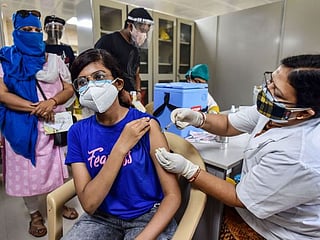Dozens of suspected COVID-19 bodies found in Indian river
Villagers blame rise in deaths and dearth of space in crematoriums

Patna: Dozens of bloated and decomposed bodies believed to be COVID-19 victims have washed up on the banks of the Ganges river in northern India, officials said Monday.
The pandemic has been spreading fast into India's vast rural hinterland, overwhelming local health facilities as well as crematoriums and cemeteries.
Local official Ashok Kumar said that about 40 corpses washed up in Buxar
district near the border between Bihar and Uttar Pradesh. “We think they came flowing from neighbouring Uttar Pradesh. We have directed concerned officials to dispose of all bodies, to either bury or cremate them," Kumar said.
Some media reports said the number of corpses could be as high as 100.
The reports quoted other officials as saying some of them were bloated and partially burned and could have been in the river for several days.
Villagers said there had been a sudden increase in the number of deaths from COVID-19 in the past month with the local cremation site working overtime. Reports said 60-70 bodies are reaching cremation sites every day in Buxar district. On Sunday, a total of 76 bodies were cremated in Buxar, officials said.
“It looks like the victims’ families have been throwing the bodies into the river, unable to wait longer for cremation due to limited space of cremation,” villagers said. “But this act has exposed them to another health crisis. The administration should act fast to save them,” they added.
Another official, KK Upadhyay, said these bodies seem to have been thrown into the water. “These bodies are bloated after being in the water for the past five-seven days. We are investigating as to where they came from,” Upadhyay said. He added people in Bihar usually cremate the bodies, they don’t throw them into the river.
According to official statistics, around 4,000 people are currently dying from coronavirus every day in India and the death toll is almost 250,000.
But citing anecdotal evidence from crematoriums, many experts believe that the true daily number could be several times higher.
This is particularly the case now that the current surge has spread beyond major cities into rural areas where hospitals are few and far between and record-keeping poor.
- with inputs from AFP
Sign up for the Daily Briefing
Get the latest news and updates straight to your inbox








